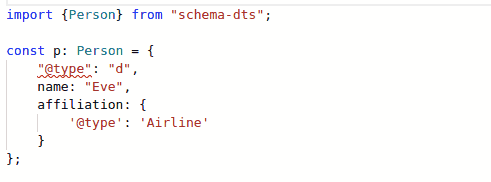
Research
Security News
Malicious npm Packages Inject SSH Backdoors via Typosquatted Libraries
Socket’s threat research team has detected six malicious npm packages typosquatting popular libraries to insert SSH backdoors.
@btakita/schema-dts
Advanced tools
A TypeScript package with latest Schema.org Schema Typings
JSON-LD TypeScript types for Schema.org vocabulary.
schema-dts provides TypeScript definitions for Schema.org vocabulary in JSON-LD format. The typings are exposed as complete sets of discriminated type unions, allowing for easy completions and stricter validation.

Note: This is not an officially supported Google product.
To use the typings for your project, simply add the schema-dts NPM package to
your project:
npm install schema-dts
Then you can use it by importing "schema-dts".
import type {Person} from 'schema-dts';
const inventor: Person = {
'@type': 'Person',
name: 'Grace Hopper',
disambiguatingDescription: 'American computer scientist',
birthDate: '1906-12-09',
deathDate: '1992-01-01',
awards: [
'Presidential Medal of Freedom',
'National Medal of Technology and Innovation',
'IEEE Emanuel R. Piore Award',
],
};
JSON-LD requires a "@context" property to be set on the top-level JSON object,
to describe the URIs represeting the types and properties being referenced.
schema-dts provides the WithContext<T> type to facilitate this.
import type {Organization, Thing, WithContext} from 'schema-dts';
export function JsonLd<T extends Thing>(json: WithContext<T>): string {
return `<script type="application/ld+json">
${JSON.stringify(json)}
</script>`;
}
export const MY_ORG = JsonLd<Organization>({
'@context': 'https://schema.org',
'@type': 'Corporation',
name: 'Google LLC',
});
JSON-LD supports '@graph' objects that have richer interconnected links
between the nodes. You can do that easily in schema-dts by using the Graph
type.
Notice that any node can have an @id when defining it. And you can reference
the same node from different places by simply using an ID stub, for example
{ '@id': 'https://my.site/about/#page } below is an ID stub.
The example below shows potential JSON-LD for an About page. It includes
definitions of Alyssa P. Hacker (the author & subject of the page), the specific
page in this URL, and the website it belongs to. Some objects are still defined
as inline nested objects (e.g. Occupation), since they are only referenced by
their parent. Other objects are defined at the top-level with an @id, because
multiple nodes refer to them.
import type {Graph} from 'schema-dts';
const graph: Graph = {
'@context': 'https://schema.org',
'@graph': [
{
'@type': 'Person',
'@id': 'https://my.site/#alyssa',
name: 'Alyssa P. Hacker',
hasOccupation: {
'@type': 'Occupation',
name: 'LISP Hacker',
qualifications: 'Knows LISP',
},
mainEntityOfPage: {'@id': 'https://my.site/about/#page'},
subjectOf: {'@id': 'https://my.site/about/#page'},
},
{
'@type': 'AboutPage',
'@id': 'https://my.site/#site',
url: 'https://my.site',
name: "Alyssa P. Hacker's Website",
inLanguage: 'en-US',
description: 'The personal website of LISP legend Alyssa P. Hacker',
mainEntity: {'@id': 'https://my.site/#alyssa'},
},
{
'@type': 'WebPage',
'@id': 'https://my.site/about/#page',
url: 'https://my.site/about/',
name: "About | Alyssa P. Hacker's Website",
inLanguage: 'en-US',
isPartOf: {
'@id': 'https://my.site/#site',
},
about: {'@id': 'https://my.site/#alyssa'},
mainEntity: {'@id': 'https://my.site/#alyssa'},
},
],
};
FAQs
A TypeScript package with latest Schema.org Schema Typings
The npm package @btakita/schema-dts receives a total of 0 weekly downloads. As such, @btakita/schema-dts popularity was classified as not popular.
We found that @btakita/schema-dts demonstrated a healthy version release cadence and project activity because the last version was released less than a year ago. It has 1 open source maintainer collaborating on the project.
Did you know?

Socket for GitHub automatically highlights issues in each pull request and monitors the health of all your open source dependencies. Discover the contents of your packages and block harmful activity before you install or update your dependencies.

Research
Security News
Socket’s threat research team has detected six malicious npm packages typosquatting popular libraries to insert SSH backdoors.

Security News
MITRE's 2024 CWE Top 25 highlights critical software vulnerabilities like XSS, SQL Injection, and CSRF, reflecting shifts due to a refined ranking methodology.

Security News
In this segment of the Risky Business podcast, Feross Aboukhadijeh and Patrick Gray discuss the challenges of tracking malware discovered in open source softare.